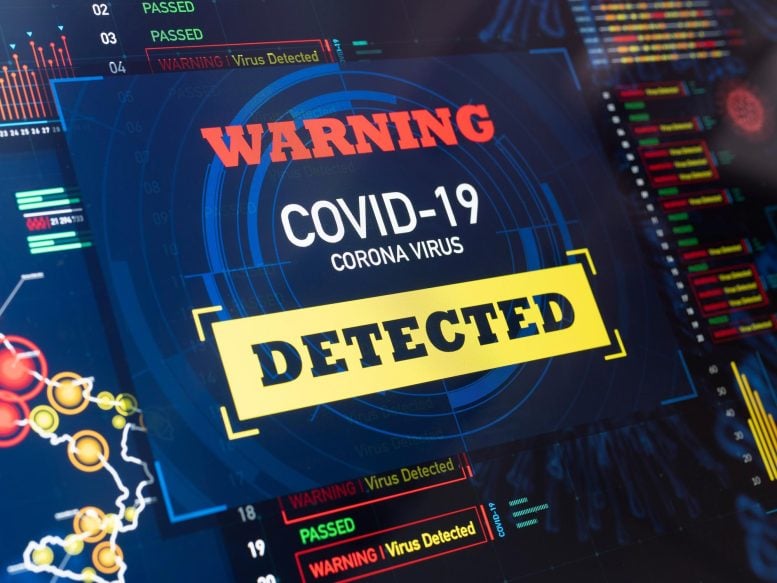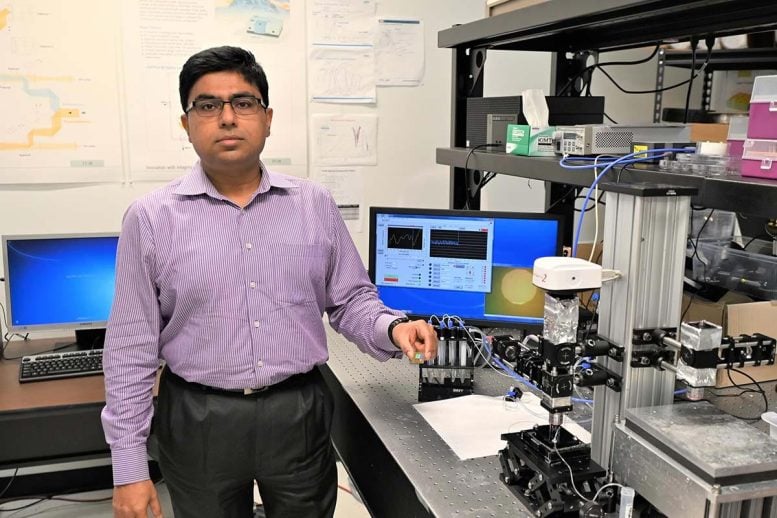
Researchers say the device can tell with 95% percent accuracy if someone has a virus, a significant improvement over current rapid tests.
University of Central Florida researchers have developed a device that detects viruses like COVID-19 in the body as fast as and more accurately than current, commonly used rapid detection tests.
The optical sensor uses nanotechnology to accurately identify viruses in seconds from blood samples. Researchers say the device can tell with 95% percent accuracy if someone has a virus, a significant improvement over current rapid tests that experts warn could have low accuracy. Testing for viruses is important for early treatment and to help stop their spread.
The results are detailed in a new study in the journal Nano Letters.
The researchers tested the device using samples of Dengue virus, a mosquito transmitted pathogen that causes Dengue fever and is a threat to people in the tropics. However, the technology can easily be adapted to detect other viruses, like COVID-19, says study co-author Debashis Chanda, a professor in UCF’s NanoScience Technology Center.

“The sensitive optical sensor, along with the rapid fabrication approach used in this work, promises the translation of this promising technology to any virus detection including COVID-19 and its mutations with high degree of specificity and accuracy,” Chanda says. “Here, we demonstrated a credible technique which combines PCR-like genetic coding and optics on a chip for accurate virus detection directly from blood.”
The device closely matches the accuracy of the gold-standard PCR-based tests but with nearly instantaneous results instead of results that take several days to receive. Its accuracy is also a significant improvement over current rapid antigen tests that the U.S. Food and Drug Administration and U.S. Centers for Disease Control have cautioned could produce inaccurate results if viral loads are low or test instructions are not properly followed.
The device works by using nano-scale patterns of gold that reflect back the signature of the virus it is set to detect in a sample of blood. Different viruses can be detected by using different DNA sequences that selectively target specific viruses.
Key to the device’s performance is that it can detect viruses directly from blood samples without the need for sample preparation or purification, thus speeding up the test and improving its accuracy.
“A vast majority of biosensors demonstrations in the literature utilize buffer solutions as the test matrix to contain the target analyte,” Chanda says. “However, these approaches are not practical in real-life applications because complex biological fluids, such as blood, containing the target biomarkers are the main source for sensing and at the same time the main source of protein fouling leading to sensor failure.”
The researchers confirmed the device’s effectiveness with multiple tests that used different virus concentration levels and solution environments, including those with the presence of nontarget virus biomarkers.
Abraham Vazquez-Guardado, the study’s lead author and a postdoctoral fellow at Northwestern University who worked on the research as a doctoral student in Chanda’s lab, says he’s excited about the potential.
“Although there have been previous optical biosensing demonstration in human serum, they still require off-line complex and dedicated sample preparation performed by skilled personnel — a commodity not available in typical point of care applications,” Vazquez-Guardado says. “This work demonstrated for the first time an integrated device which separated plasma from the blood and detects the target virus without any pre-processing with potential for near future practical usages.”
Chanda says next steps for the research include adapting the device to detect more viruses.
Reference: “DNA-Modified Plasmonic Sensor for the Direct Detection of Virus Biomarkers from the Blood” by Abraham Vázquez-Guardado, Freya Mehta, Beatriz Jimenez, Aritra Biswas, Keval Ray, Aliyah Baksh, Sang Lee, Nileshi Saraf, Sudipta Seal and Debashis Chanda, 8 September 2021, Nano Letters.
DOI: 10.1021/acs.nanolett.1c01609
Study co-authors are Freya Mehta, Beatriz Jimenez, Keval Ray, Aliyah Baksh — undergraduate students at NanoScience Technology Center; Aritra Biswas ’21MS — a doctoral student with UCF’s College of Optics and Photonics; Sang Lee ’16 — a master’s student at the NanoScience Technology Center; Nileshi Saraf — a graduate of UCF’s Department of Material Science and Engineering doctoral program; and Professor Sudipta Seal —chair of UCF’s Department of Material Science and Engineering.
Chanda has a joint appointment in UCF’s Department of NanoScience Technology Center, the Department of Physics and the College of Optics and Photonics. He received his doctorate in photonics from the University of Toronto and worked as a postdoctoral fellow at the University of Illinois at Urbana-Champaign before joining UCF in 2012.
The research was partially supported by National Science Foundation and UCF’s COVID-19 Artificial Intelligence and Big Data Initiative program.
Never miss a breakthrough: Join the SciTechDaily newsletter.